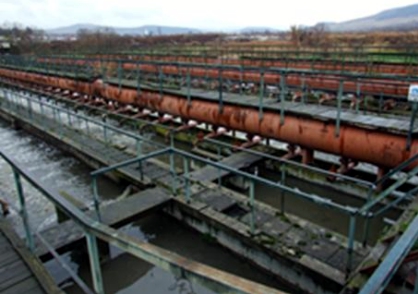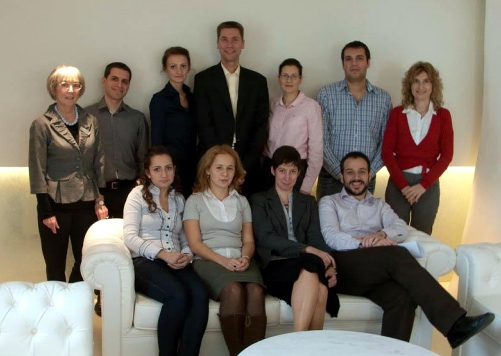 Water is an invaluable resource; already in 1992 it took centre stage at the first international conference of the United Nations on environmental protection and sustainability. The United Nations have declared the years 2005 to 2015 to be the international “Water for Life” Decade.
Water is an invaluable resource; already in 1992 it took centre stage at the first international conference of the United Nations on environmental protection and sustainability. The United Nations have declared the years 2005 to 2015 to be the international “Water for Life” Decade.
Due to the shortage of the precious resource water and the consequences of the climate change, numerous European policies have been developed and adopted for the protection and sustainable utilization of water, creating a huge demand in particular in vocational training.
 Wastewater Treatment Plant in Sibiu, RomaniaEconomic factors like privatization and increasing cost pressure in water management are heightening these educational needs, leading to the demand for VET (Vocational Education and Training) opportunities and products as compact and tailor-made as possible. The situation of vocational education and training in water management will be improved by the WACOM instrument, which defines within the water sector the needed competences and qualifications for the different tasks, working places and employees for the first time.
Wastewater Treatment Plant in Sibiu, RomaniaEconomic factors like privatization and increasing cost pressure in water management are heightening these educational needs, leading to the demand for VET (Vocational Education and Training) opportunities and products as compact and tailor-made as possible. The situation of vocational education and training in water management will be improved by the WACOM instrument, which defines within the water sector the needed competences and qualifications for the different tasks, working places and employees for the first time.
In this way WACOM will lead to an increase of the volume of mobility throughout Europe as well as to a higher transparency and recognition of qualifications and competences. All and in, particular modular VET opportunities and products in water management can be exactly defined concerning the addressed competences and qualifications, and will become transparent and easy to select in that they fit accurately for users.
The project WACOM (WAter COmpetences Model Transfer) transfers the European Qualification Framework (EQF) and the German Reference Model for the Competence Modelling PAS 1093 into the water sector and its Vocational Education and Training (VET) throughout Europe.
That enables the identification of the VET needs by employees and learners, of required competences and qualifications at specific working places as well as of the improvement of transparency and comparability of VET opportunities and products. The development of the WACOM instrument is supported by the transfer of the competence and qualification model into the water sector and by the adaptation for the selected topic management of sewage treatment plants. WACOM will have an impact on vocational training in water management in its entirety as well as in additional sectors.
The main WACOM products and aims are:
The Competence Model for the Water Sector: Development of WACOM (the WAter COmpetences Model) as the establishment of a competence model for the water sector based on EQR and PAS 1093: The aim is the foundation of vocational training on the principle of competence modeling, which is based on the identification of the specific demands and needs of the water management and existing practices concerning competence models in the water sector.
WACOM Instrument: Optimization and adaptation of WACOM (the WAter COmpetences Model) to the vocational education and training systems and cultures in Europe. Finally the WACOM instrument will be used for the description of the competences and qualifications as well as for the improvement of their transparency and comparability.
The WACOM Competence Model describes the core competences for employees working in the water sector and can be applied to Wastewater Treatment Plants (WWTPs) and transferred to other branches. In this way WACOM will lead to an increase of mobility throughout Europe as well as to a higher transparency and recognition of qualifications and competences.
The competence model is composed of water competences which were developed out of personal interviews with water experts and from a process which analysed the water sector,reviewed and refined by the outcomes of the WACOM National Workshops and the WACOM Online Survey. A detailed description of all collected competences allows for a standardised usage of the WACOM competence model.
The Water Competences are the complete list of core competences for the water sector, directly related to the requirements and needs from the water sector, the working places and job profiles.
These Water Competences are consisting of:
1. Key competences (for the water sector): For the specific objectives and purposes of WACOM and the WACOM Water Competence Model, we have adapted the key competences for lifelong learning from the European policy to the needs and requirements of the water sector.
2. Competences from the water sector: The competences were categorised for a better usability and overview in two categories: individual competences and water-specific competences. It can be emphasised (beside the key competences developed by the European Policy) that these are the core competences for the water sector: therefore they will be called “Water Competences”. Definitions for Knowledge, Skills and Competences (adapted from EQF and PAS 1093) and five Levels were develope as a basis for the WACOM Project and the WACOM Competence Model were defined as follow:
Knowledge: Outcome of learning processes related to information [adapted from EQF]
Skills: Outcome of learning processes related to actions including the performance to apply knowledge and use know-how to complete tasks and solve problems (cognitive or practical) [adapted from EQF]
Competence: Ability (that cannot be observed directly but only by activities) to adequately and successfully combine and perform necessary activities in any contexts to achieve specific tasks or objectives [adapted from EQF]
 WACOM Consortium at Kick-Off Meeting in Athens, Greece
WACOM Consortium at Kick-Off Meeting in Athens, Greece
Tables for the description of competences, as well as and Job profiles were developed. The template for competence description consists of the definition of the competence, followed by the target group of said competence. Knowledge as well as skills have to be defined and combined with the suitable minimum required level.
The specific objectives of the project are:
1. The transfer and the adaptation of the European Qualification Framework (EQF) and of the German Competence Model (PAS 1093) for water management as the “European WAter COmpetence Model (WACOM)”
2. The application of the WACOM instrument for the field of management of wastewater treatment plants through the definition of different competences and qualifications for diverse tasks, working places and (groups of) employees
3. The pilot-testing of WACOM through the application for the vocational training offered by the Water Academy of the German Association DWA, on the topic management of wastewater treatment.
4. The further evaluation in three additional (south-)eastern European countries (GR, RO, HU) for vocational training in the field of management of wastewater treatment plants and the optimization of WACOM in parallel processes
5. The dissemination and exploitation of WACOM within Europe in its entirety
6. The transfer of WACOM and of the underlying competence model for the water management into the European standardization (CEN) as well as in other sectors through a feasibility study
Through these objectives, the situation of the vocational training in the water management will be improved in a sustainable way and the problems identified by the needs analysis will be overcome. Through WACOM, a first competence and qualification model for water management will be established exemplarily for the management of wastewater treatment plants which can be transferred easily into other fields in the water sector (and also into other sectors).
All VET opportunities and products in water management and particularly modular products can be exactly defined concerning the addressed competences and qualifications, thus becoming transparent and easy to select in that they are accurately fitting for users.
The young and motivated consortium consisting of seven partners from four countries (the University of Duisburg-Essen (Coordinator) and the German Association of Water, Wastewater and Waste from Germany, Agro-Know Technologies and the Technological Educational Institute of Athens from Greece, the Technical University of Civil Engineering Bucharest and the Regional Training Centre for Local Public Administration Sibiu from Romania and the Environmental Protection and Water Management Research Centre Nonprofit Ltd from Hungary) has recently started the pilot-testing in several chosen wastewater treatment plants. The aforementioned WACOM Competence Model provides several excellent benefits and reasons for its usage in the management of wastewater treatment plants:
Thus the wastewater treatment plants can take advantage through the implementation of the Water Competence Model developed by WACOM. All results and developments during the WACOM Project will be presented during the European Conference: “Competence Modelling for the Water Sector” on the 21st of September, 2011 in Brussels, Belgium. All experts from water sector are welcome to submit a paper on a suitable topic and attend the European WACOM Conference!
———————————————————————————-
WACOM Contact: www.wacom-project.eu
Coordinator: Christian M. Stracke
Organization: University of Duisburg-Essen
http://www.wip.uni-due.de/
Address: Universitaetsstr. 9 (ICB) 45141 Essen, GERMANY
Telephone: +49 (0)201-183-4410
E-Mail: [email protected]